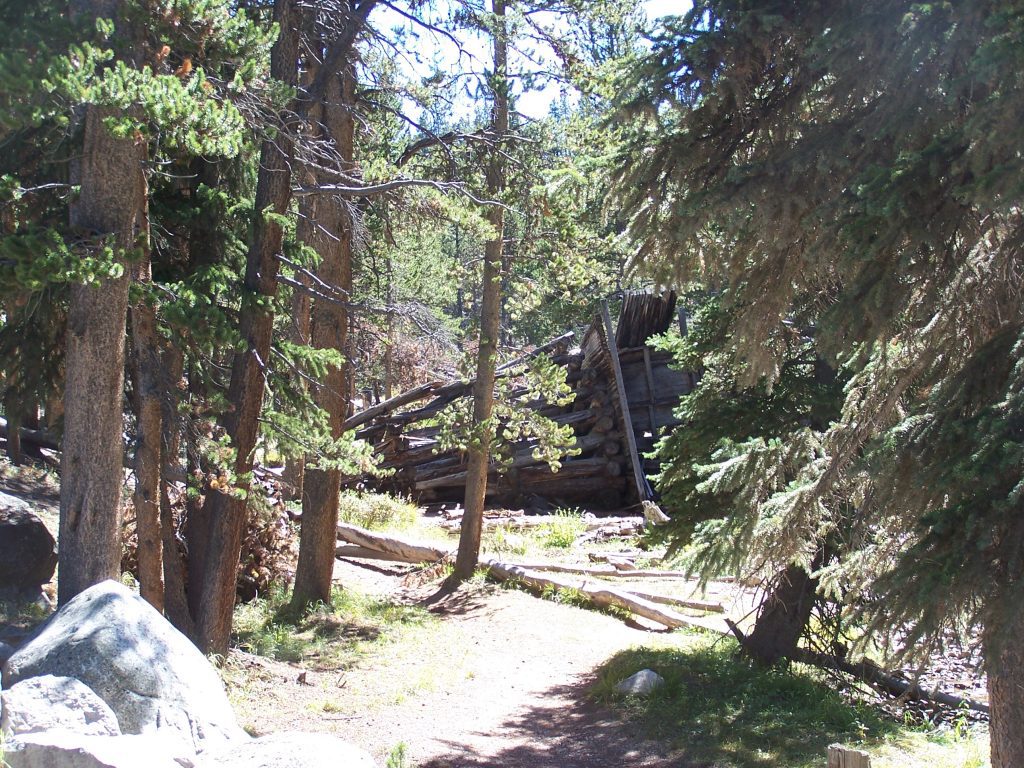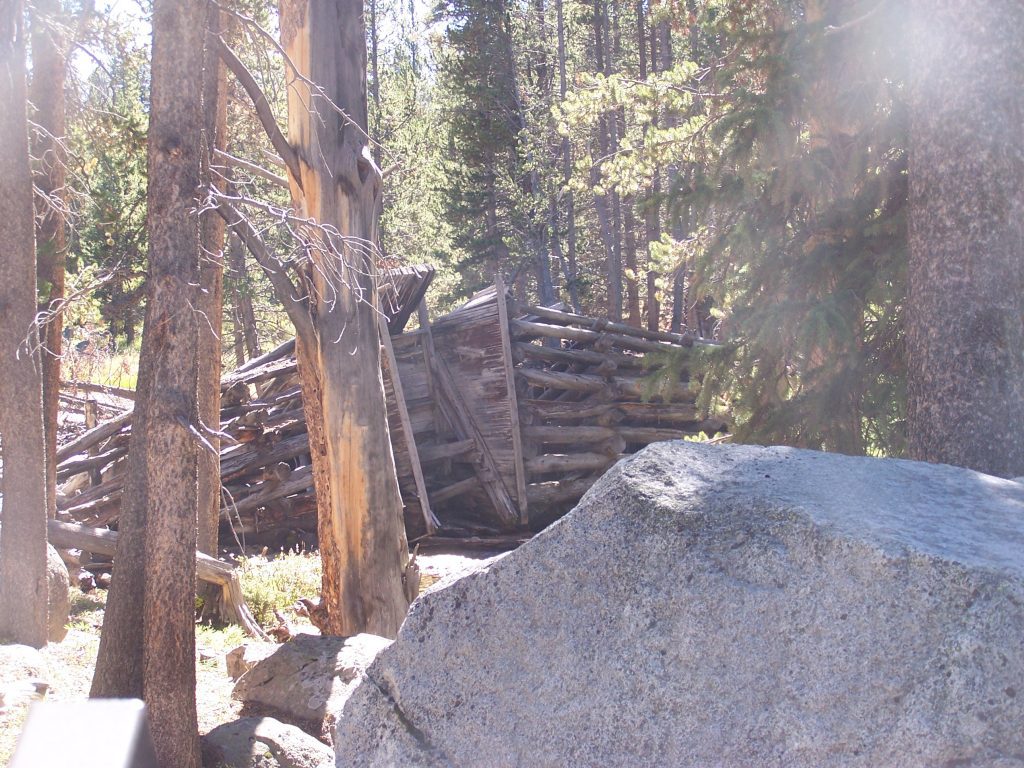alt
A Forest Fire Consumed a Mountain Town, 123 Years Ago

According to a small story in the book, Snippets of Sheridan County History by Cynde Georgen, published by the Sheridan County Historical Society in 2013, it mentioned that in August of 1899, a forest fire on Dry Fork of the Little Horn River began burning out of control and was heading towards the small mountain community of Rockwood. People were evacuated, and the camp teacher led a group down the mountain by way of the flume.
Rockwood was a small town established along the Tongue River Tie Flume in the Bighorn Mountains. In the The Cheyenne Daily Sun, on April 8, 1895, there is this small news item: A new post office has been established at Rockwood, Sheridan County, and George W. Hall has been named as postmaster.

At one time, in addition to the post office, the town had a store, a blacksmith shop, a cookhouse, bunkhouses and a school. Several families built cabins around the town. McShane and Company, who owned the tie operation, employed around 150 people in and around the small community.

As was common in most Wyoming towns, even today, there was, of course, a saloon. Sometimes things got rowdy.
From the News-Register, Evanston, on November 14, 1896: A Cheyenne dispatch of Nov. 9th says: Word was received here today of a fatal shooting at a tie camp in the Big Horn mountains on election day. The shooting was done by Fred Hyle, a saloon keeper at Rockwood, Sheridan County. Charles Murray, a tie contractor, was drinking in Hyle’s saloon and according to Hyle’s story, tried to climb over the bar to attack Hyle.
Hyle says: “He had a reputation as a prize fighter and I was afraid I might not be able to hold my own with him, so I grabbed a gun and shot him through the forehead, killing him instantly.” Hyle was given a hearing and pleaded not guilty to the charge of murder. He was bound over to the district court and gave bail, in the sum of $10,000 for his appearance.
In The Sheridan Post on Sept. 7, 1899, there is a report of the fire. About 10 o’clock last Friday morning a fire was discovered between the two forks of Tongue River river above the tie camp of J.H. McShane and Co. The cause of the fire is attributed to the carelessness of a party of hunters that were camped in that vicinity. Forest Ranger Frank Kueny made a long and tedious ride to warn the tie choppers that were camped throughout the district of the approaching danger. The tie choppers were soon gathered to fight the fierce flames after having all of their possessions burned up,
Superintendent of Forest Reserve! C. W. Garbutt and Supervision W. E. Jackson were soon notified and made a quick ride to the scene of smoke and flames. The company’s commissary which is located just above the Tongue River Canyon was full of supplies and the company under the leadership of Jerry Dunlay called out every man to fight fire and save the little settlement of Rockwood.
The settlement is comprised of the commissary building, offices, storerooms, hay corrals, schoolhouse, sawmill and quite a number of buildings used by employees with their families.
The situation did not seem so critical until the fierce winds of Saturday and Sunday made the progress of the flames so rapid as to exclude all hope of saving the little town. Some portions of the supplies were carried to places of safety and the flames licked up everything of value except two or three dwelling houses.

One account said that some of the supplies were sunk the in the shipping pond to protect them from the fire.
Mrs. J. H. Culter who kept the large company boarding house lost all of her goods and was compelled to buy an entire new outfit from our local dealers. Jerry Dunlay lost all of his personal effects as did many others. After the fire had become general the heat was intense and the wild game could be seen hunting places of safety. Hundreds of rabbits could be seen dodging out of the way of the fire and would invariably go back into the flames and lose their lives.
Bear were also seen and Mr. Hill was surprised to see a large fellow break out of a smoking thicket and run directly toward him but missed him by about 10 feet. Mr. Hill was scared and so was the bear and neither had time to exchange the usual compliments of the day.
The tie choppers, the mountain rangers and a few volunteers were kept fighting and the Nickel & Copper Refining Company’s buildings were found to be in danger which caused the force of men at that point to join the fighters.
W. C. Garbutt telegraphed to Supt. Nutt to send all the men possible from Sheridan and the B. & M. showed its usual generosity by sending the entire gang of men at this place, about 40. They left Sunday evening and were taken from Ranchester in wagons and landed at the scene of action the following morning. About noon Monday the fire was confined so that it was thought possible it could be kept in control. The men were prepared for any emergency and the backfires went kept, going so as to make it doubly safe. At times the wind was so strong that it broke trees down and caused the fire to leap across the canyon a distance of a quarter of a mile, making it impossible to attempt to check it. The heat at the tie camp caused the glass insulators which were used on the phone lines to melt into a shapeless mass.
The stove in the schoolhouse was melted which shows clearly that the great and intense heat was caused by the awful wind. Phil McShane came down Tuesday and ordered a new outfit including a sawmill to be shipped immediately.
The company is showing the true western spirit and will have new buildings erected before the ground is thoroughly cooled off
No great number of ties have been burned although they have about 30,000 on the ground. About one and a half miles of flume was burned which will quickly be repaired. Several herds of cattle are being held near the fire section and the owners are on the ground and will drive them to protected districts Mr. Garbutt returned to town Tuesday evening and thinks that about four townships have been burned over. This is one case that shows the wisdom of having our mountain timber land under the supervision of an officer who will be able to act in time of need.

The town was rebuilt and named Rockwood 2, to avoid having to apply for a new post office. However, in 1900 the railroad was completed, so the company continued to cut and shape logs for a time for building cabins, fence posts, telephone poles, lumber, and timbers used to shore up the underground coal mining tunnels around the area.
A huge forest fire destroyed a small town, 123 years ago.

